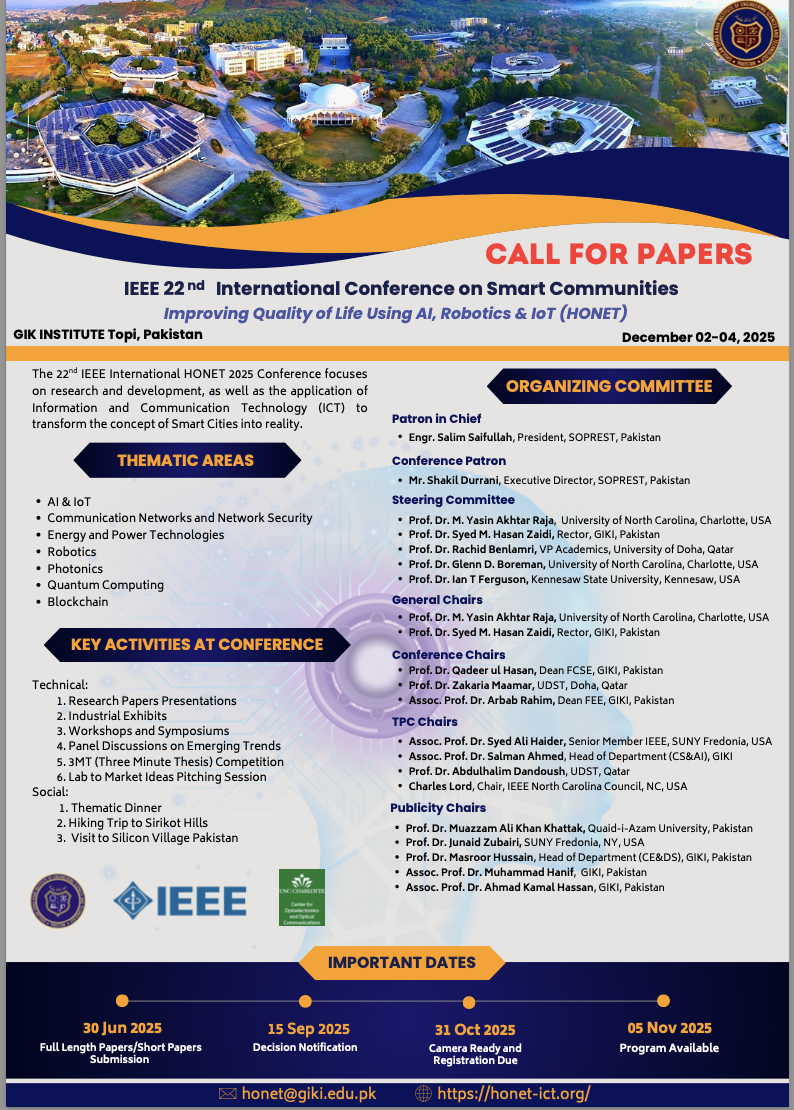GIKI, Topi, Pakistan | December 02-04, 2025

call for papers
The HONET conference has not only successfully achieved its primary objective but has also excelled in attracting high-quality research papers from across the globe. The conference has progressively established itself as a prominent platform for research addressing both local and global challenges in the fields of science and technology. The 22nd International Conference HONET 2025 will focus on Research and Development, as well as the application of Information and Communication Technology (ICT) to transform the concept of Smart Cities into reality. In particular, the conference will delve into the role of the Internet of Things (IoT) and Artificial Intelligence (AI), data analytics, quantum computing, blockchain, and intelligent energy and transportation systems, all in the context of ICT, through its technical sessions. As in previous HONET events, we anticipate receiving papers on these thematic areas, along with related emerging and enabling technologies.papers
Authors are invited to submit R&D and concept papers presenting original research work related to the practice and theory related to the scope of HONET thematic areas. Related proposals for Workshops and Tutorials will be considered. All submissions must describe original and pertinent research, development, and future vision. The topics of interest include, but are not limited to the ones shown below.These topics should be discussed in terms of research findings, concepts, state-of-the-art, standards, implementations, developments, field trials/experiments, educational goals, and new applications. Submitted or substantially similar papers must not be under review currently for any other publication.
topics:
Artificial Intelligence
Comp. and Comm. Netw.
IoT
Network Security
Energy and Power Tech.
Robotics
Photonics
Quantum Computing
Blockchain
| 1. AI & IoT |
| a. Enhancing the capabilities of Smart Communities using AI |
| b. Machine Learning models for Smart Cities (LSTM, Deep Learning, Transformers) |
| c. Realizing Smart Localities using IoT |
| c. Computer Vision and it's application in Smart Cities |
| 2. Robotics |
| a. Robotics & Automation |
| b. Autonomous Vehicles and Charging Technologies |
| 3. Computer and Communication Networks and Network Security |
| a. Wireless Networks |
| b. Photonic Networks |
| c. 5G/6G Communication and beyond |
| e. Network Security and Forensic Analysis |
| 4. Energy and Power Technologies |
| a. Renewable Energy Sources |
| b. Smart-Grids and Robust Infrastructure |
| c. Smart Storage and Demand & Response |
| d. Micro Grid Analytics and Management |
| e. Smart Grid and Smart Cities |
| 5. Blockchain for Smart Cities |
| a. Blockchain for Smart Grid and Energy Management |
| b. Blockchain for Traffic Management and Autonomous Vehicles |
| c. Blockchain for Secure and Efficient IoT Integration |
| d. Blockchain for Data Sovereignty and Citizen Privacy |
| 6. Quantum Computing |
| a. Quantum-Enhanced Optimization for Urban Planning |
| b. Quantum Machine Learning for Smart City Data Analysis |
| c. Quantum-Enhanced Machine Vision for Smart Surveillance Systems |
| d. Quantum AI for Smart Healthcare Systems |
| e. Quantum-Assisted Smart Contracts |
| 7. Photonics |
| a. LEDs, Lasers and Solar Cells and Panels |
| b. Packaging |
Accepted papers will be submitted for inclusion into IEEE Xplore subject to meeting IEEE Xplore’s scope and quality requirements.
Received papers will be peer reviewed using “IEEE standards and criteria.” Authors should note that only the accepted and presented papers will be eligible for final proceedings. Papers accepted but not presented will be omitted from publications on IEEE Xplore. TPC reserves the right to reject any paper at any stage that is found to be plagiarized or not following the guidelines.
Paper submissions will be handled via EDAS.
Read Author Instructions and Submit Important Dates




 conference program
conference program



